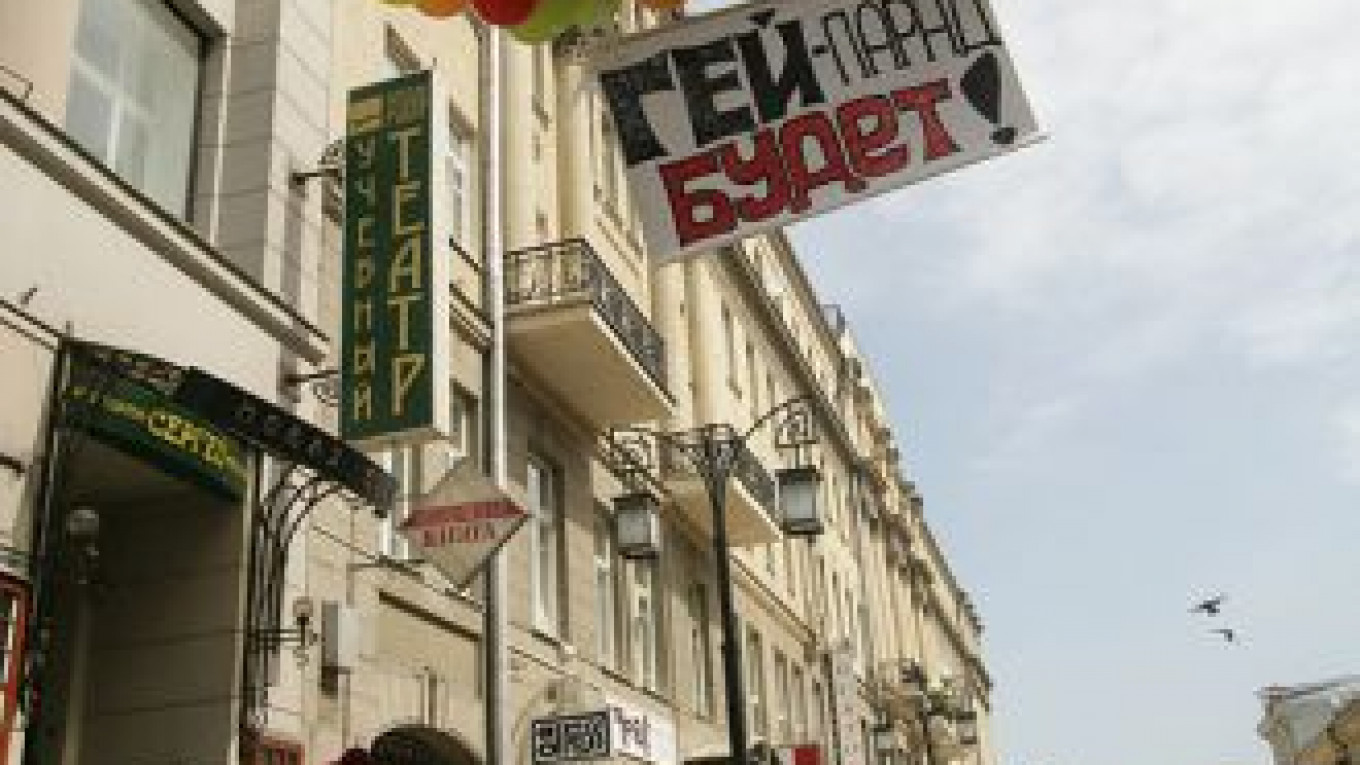The Council of Europe may pressure Russia on gay rights, including Moscow City Hall's ban on gay pride parades, a senior European lawmaker said Wednesday.
Russian sexual minorities see the same kind of pressure as the country's political opposition, which is a violation of basic human rights, Andreas Gross, a member of the human rights committee with the council's Parliamentary Assembly, told The Moscow Times.
Gross was visiting Moscow to participate in a round table on homophobia, held Wednesday as part of a public campaign for sexual minority rights staged by gay activists this week.
"The respect is not there when it comes to non-mainstream political organizations and non-mainstream sexual orientation," Gross told the round table.
His committee is drafting a Russia report on human rights, including gay rights, together with the State Duma. The report will be presented to the Council of Europe, though Gross did not specify a date.
Gross' main complaint was with the ban on gay pride parades. Activists have campaigned for years to hold the parades in Moscow, but long-serving Mayor Yury Luzhkov spoke against it, calling homosexuals "satanic." Sergei Sobyanin, who replaced him as mayor last fall, has upheld the ban, saying in February: "In short, we won't have any gay pride rallies. Moscow doesn't need them."
The authorities' opposition to parades represents the tip of the problem, because many hate crimes against gays and lesbians go unreported by victims afraid to attract attention, said Igor Kochetkov, head of the Russian Lesbian and Gay League. He could not provide crime estimates.
Gross, speaking to The Moscow Times on the sidelines of the round table, did not elaborate on the possible consequences of his report. But a Moscow-based UN diplomat said political discrimination against sexual minorities has harmed Russia's image for years — a problem that even Russian officials admit in private conversations. He spoke on condition of anonymity because he was not authorized to talk to the media.
But pushing for gay rights might have domestic repercussions because many people remain hostile toward sexual minorities and are likely to disapprove of any political effort to support them.
Even the liberal Yabloko party is divided on whether to collaborate with gay activists, said Galina Mikhailova, a senior party member who attended Wednesday's round table.
"It is a very difficult topic that can only be resolved in a democratic country, not in an authoritarian one like ours," she said.
In a tacit confirmation of her words, the country's six other registered political parties, including the ruling United Russia, declined to participate in the round table.
Male homosexuality was a criminal offense in the Soviet Union, but the clause was canceled by Russia, which after joining the Council of Europe in 1996 signed the European Convention of Human Rights that holds it responsible for protecting the rights of sexual minorities.
Still, homophobia runs deep in society, with Tambov Governor Oleg Betin even saying publicly in 2008 that gays "should be torn apart and their pieces thrown to the wind." Gay activists unsuccessfully sued him over the statement.
Kochetkov said Wednesday that Betin's call, if taken literally, would result in the slaughter of 4 percent of the population. He was referring to a nationwide Levada poll on sexual orientation conducted last year.
"That means each of us could potentially be killed," Kochetkov said.
A Message from The Moscow Times:
Dear readers,
We are facing unprecedented challenges. Russia's Prosecutor General's Office has designated The Moscow Times as an "undesirable" organization, criminalizing our work and putting our staff at risk of prosecution. This follows our earlier unjust labeling as a "foreign agent."
These actions are direct attempts to silence independent journalism in Russia. The authorities claim our work "discredits the decisions of the Russian leadership." We see things differently: we strive to provide accurate, unbiased reporting on Russia.
We, the journalists of The Moscow Times, refuse to be silenced. But to continue our work, we need your help.
Your support, no matter how small, makes a world of difference. If you can, please support us monthly starting from just $2. It's quick to set up, and every contribution makes a significant impact.
By supporting The Moscow Times, you're defending open, independent journalism in the face of repression. Thank you for standing with us.
Remind me later.






